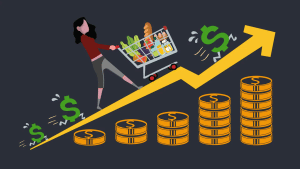South Africans are currently grappling with the challenges posed by rising inflation, a phenomenon that is significantly impacting their standard of living. This economic condition is not just a statistic; it’s a reality that drives up the cost of essential goods and services, creating a ripple effect across households.
As inflation continues to escalate, many families are finding it increasingly difficult to manage their budgets effectively. The soaring prices of basic necessities such as food, fuel, and healthcare put immense pressure on consumers, forcing them to make tough choices about their spending priorities.
In this blog post, we’ll delve into how inflation is affecting the purchasing power of South African consumers and explore the implications for their financial well-being. We’ll discuss the strategies households can adopt to cope with these economic challenges and what the future may hold as the nation navigates this turbulent financial landscape.
The Ripple Effect of Inflation on South African Households

Inflation does not merely increase the price of items; it has a cascading effect on nearly every aspect of daily life. One of the most noticeable impacts is on household expenses. From groceries to utilities, the cost of living is climbing steadily.
Families are forced to make tough choices about their spending habits, often cutting back on leisure activities to prioritize essential expenditures. The pressure on disposable income is keenly felt, as more of it is allocated to basic needs rather than savings or investments. With continued inflation, the purchasing power of South Africans is expected to weaken further, limiting their ability to spend and thereby slowing economic growth.
Impact on Food Prices
A significant component of any household budget is food. Unfortunately, inflation has had a particularly harsh impact on this sector. Prices of staple foods have surged, making it challenging for families to maintain a nutritious diet.
Vegetables, grains, and dairy products have all seen substantial price hikes, forcing consumers to either pay more or sacrifice quality and variety. This situation is particularly detrimental to lower-income households, who spend a higher percentage of their income on food. Reduced access to affordable nutrition could have long-term health implications, adding another layer of concern to an already complex problem.
Effect on Housing and Utilities
Another area severely impacted by inflation is housing. Whether renting or owning, South Africans are facing rising costs, influenced by both increased demand and the rising price of materials needed for construction and maintenance.
Additionally, utilities such as electricity and water have become more expensive, further stretching household budgets. These rising costs compel families to make difficult decisions about how to allocate their limited financial resources. As housing and utilities are essential, the increase in these prices means cutting back in other areas, such as education or healthcare, creating a ripple effect on overall well-being.
The Broader Economic Implications
The rising inflation rate has significant repercussions not just for individual households but for the broader economy as well. When consumers have less purchasing power, demand for non-essential goods and services declines.
This reduced consumer spending can stifle economic growth, as businesses may experience lower sales and profitability, potentially leading to layoffs and higher unemployment rates. As businesses struggle and consumer confidence wanes, the entire economic landscape could be impacted, making recovery more challenging.
Challenges for Small Businesses
Small and medium-sized enterprises (SMEs) are often the hardest hit by inflation. These businesses are less able to absorb rising costs compared to larger corporations, making it difficult for them to maintain operations and profitability. Higher prices for raw materials and labor force many SMEs to either raise their prices or reduce their workforce, both of which can result in decreased customer satisfaction and loyalty.
Additionally, reduced consumer spending affects SMEs more acutely, as they rely heavily on local patronage. This scenario creates a vicious cycle, where struggling businesses contribute to rising unemployment and decreased consumer confidence.
Government Response and Policy Measures
To mitigate the impacts of rising inflation, government intervention is crucial. Policymakers need to implement measures to stabilize prices and support vulnerable households and businesses. Possible strategies include subsidies for essential goods, tax relief, or direct financial assistance to low-income families.
Central banks may also need to adjust interest rates to control inflation, though such measures can have their own economic repercussions. Effective policy actions can help cushion the blow of inflation, making it more manageable for both consumers and businesses. However, these measures must be carefully designed and implemented to avoid exacerbating existing problems.



